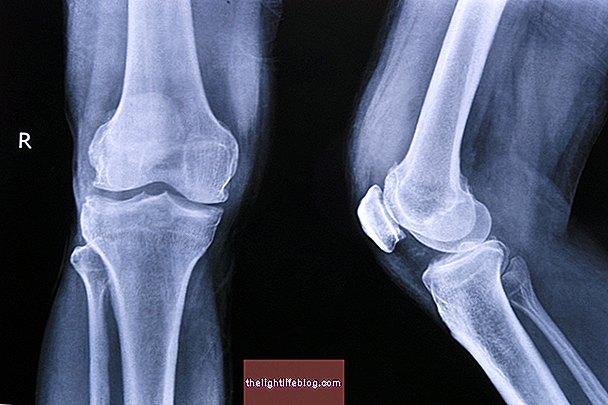Snoring is a noise-producing disorder due to difficulty in passing air through the airways during sleep, which can end up causing sleep apnea, which is characterized by periods of a few seconds or minutes, during which the person is breathe. Learn more about what sleep apnea is.
This difficulty in the passage of air usually occurs through narrowing of the airways and pharynx, through which air passes, or through the relaxation of the muscles of this region, especially during deep sleep, due to the use of sleeping pills or beverage consumption alcoholic beverages.
To end snoring, exercises can be done that help strengthen the muscles of the airways, as well as having attitudes such as losing weight and avoiding the use of sleeping pills. If the snoring is persistent or more intense, it is also important to seek the general practitioner or pulmonologist, to identify the causes and guide the treatment.

6 exercises to end snoring
There are exercises that help strengthen the muscles of the airways, which treats or decreases the intensity of snoring. These exercises should be done with a closed mouth, avoiding to move the chin or other parts of the face, concentrating on the tongue and sky of the mouth:
- Push your tongue against the roof of your mouth and slide backwards, as if sweeping, as much as you can for 20 times;
- Suck the tip of the tongue and press it against the roof of the mouth, as if it were glued together, and hold for 5 seconds, repeating 20 times;
- Lower the back of the tongue, also contracting the throat and uvula for 20 times;
- Raise the roof of the mouth, repeating the "Ah" sound, and try to keep contracted for 5 seconds, for 20 times;
- Place a finger between the teeth and the cheek, and push the finger with the cheek until it touches the teeth, keeping contracted for 5 seconds, and alternate the sides;
- Fill a birthday balloon, with the cheeks contracted . When pulling the air, one must fill the belly, when blowing the air, feel to contract the musculature of the throat.
In order to do well the movements, it takes some training time. If there is any difficulty, it is recommended to ask for a hearing aid to assess if the exercises are being done correctly.
How To Stop Snoring Naturally
In addition to exercise, there are attitudes that help the person to stop snoring naturally, such as sleeping on the side, avoiding smoking, avoiding alcohol, slimming, and using devices that help stop snoring, such as a mouthguard that can be prescribed by dentist. Learn more tips on what to do so you do not snore anymore.
If snoring is very uncomfortable or does not improve with these measures, it is important to seek a general practitioner or pulmonologist to help identify causes and guide appropriate treatment.
In the case of more severe snoring or associated sleep apnea, when there is no improvement with these measures, the treatment must be guided by the pulmonologist, made with the use of an oxygen mask called CPAP or with surgery to correct deformities in the airways that are causing the snoring. Learn more about what are the treatment options for sleep apnea.

How Snoring Rings Work
The anti snoring bands are placed over the nostrils and help decrease the intensity of snoring as they open up more nostrils during sleep, allowing more air to enter. In this way, it decreases the need to breathe through the mouth, which is one of the main responsible for snoring.
To use the band, you must glue it horizontally over the nostrils, fixing the tips over the wings of the nose and passing over the bridge of the nose.
While it may be a relief for a large majority of cases, there are people who do not get any kind of benefit, especially if snoring is being caused by problems like nose inflammation or changes in the structure of the nose.
Main causes of snoring
Snoring happens during sleep because, at this time, there is relaxation of the muscles of the throat and tongue, which are positioned a little further back, which hinders the passage of air.
The people most predisposed to developing this disorder are those with anatomical changes that narrow the passage of air, such as:
- Flaccidity of throat muscles;
- Nasal obstruction caused by excess mucus or phlegm;
- Chronic rhinitis, which is inflammation of the nasal mucosa;
- Sinusitis which is inflammation of the sinuses;
- Nasal polyps;
- Adenoid glands and enlarged tonsils;
- Retracted chin.
In addition, some lifestyle habits, such as smoking, being obese, taking sleeping pills, sleeping belly up and abusing alcoholic beverages, are more likely to cause snoring.
Snoring may exist in isolation, or it may be a symptom of a condition called sleep apnea syndrome, which impairs breathing and sleep quality, causing various symptoms such as daytime drowsiness, irritability, and difficulty concentrating.





















